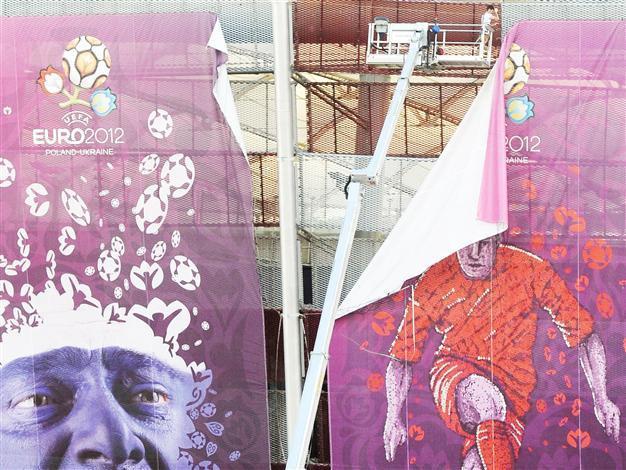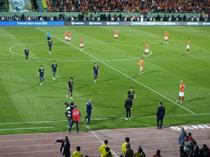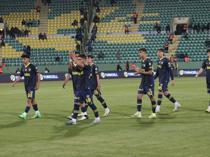Euro 2012: The Best Saved for the Last
ISTANBUL - Hürriyet Daily News

Workers dismantle decoration on the National Stadium after Poland hosted its last Euro 2012 match, the semifinal between Italy and Germany, in Warsaw. AP Photo
Hope you enjoyed it while it lasted: Euro 2012 has wrapped up and is likely to go down in history not only as a great tournament but as the last one conducted in the longstanding tradition of a football tournament as we know it.Euro 2012 has been a great tournament. At least in the humble opinion of this journalist who always favors looking at the brighter side of life when it comes to football, it was up there with the best. Given that UEFA President Michel Platini looks determined to alter the face of the tournament with radical changes, including increasing the number of participant teams and number of host locations to “up to 12 cities” across the continent, Euro 2012 was the European football championships saving the best for last – almost.
Euro 2012 had lots of quality games: There were “no Mickey Mouse games” as Liverpool defender Jamie Carragher called it. In a 24-team tournament, there will hardly be any “Groups of Death,” and first-round shocks will be erased from the competition.
There were goals – beautiful, stunning, eye-catching ones. The acrobatics of Swede Zlatan Ibrahimovic’s strike against France or Italian Mario Balotelli’s goal against Ireland were worth watching several times. Englishman Danny Welbeck’s heeled goal against Sweden showed true artistry while Croat Mario Mandzukic’s equalizer against Italy was a genuine craftsmanship effort – showing two separate examples of quality finishing in short-range efforts. Mario Gomez’s double that downed the Dutch could be seen as two examples of two different approaches to scoring.
Shocks and upsets
Speaking of the Dutch, the Euro 2012 had – like any other tournaments – its fair share of shocks and upsets, but it was not as overwhelming as, say the 2002 World Cup. The Netherlands booking its return tickets early was one disappointment, while the Czech Republic and Greece making their way to the quarterfinals was a surprise but, in the end, few could argue that the remaining two finalists were probably the ones that most deserved their place.
Of course, summer tournaments are set up as a stage where the best of the best meet against each other, and Euro 2012 provided a scene where many of the top stars of the continent turned up: Portugal’s Cristiano Ronaldo, Germany’s Mesut Özil, Spain’s star-studded Barcelona and Real Madrid players shone accordingly. Seasoned veterans, like Italy’s Andrea Pirlo, England’s Steven Gerrard or Ukraine’s Andriy Shevchenko bowed out with some grace in probably their final major tournament. Dutch and French stars, on the other hand, were the main reasons that their national teams disappointed.
Great tournaments have their stars, but they also have their sleepers: Maybe Euro 2012 lacked those out-of-the-blue players that won unexpected recognition or success. However, in this day and age, it is quite hard for a European player to go unnoticed before making it to the national team. Spanish left back Jordi Alba, Czech winger Vaclav Pilar and Danish defender Simon Kjaer were among the three top-performing young players, and they were signed by La Liga, Bundesliga and Serie A clubs even before the tournament was completed. So, it should be naive to think the tournaments would create their Karel Poborskys or Oliver Bierhoffs in today’s football.
On top of everything, football championships create great spectacles outside the stadia, as fans from different countries gather, chant together, tease each other and, occasionally, fight each other, a la Russia vs. Poland – even if the fights are never as numerous as they are seen in news reports. Ultimately though, they just have fun and return home. They don’t dwell on results that much. For fans, it is always more about the occasion – and the experience. Turning the football championships into a Champions League-style stage would decrease some of that extravagant spending by governments (frankly, Lechia Gdansk is unlikely to need a 45,000-seat stadium playing in the Polish Ekstraklasa, just as South Africa’s Platinum Stars definitely do not need 42,000 seats for the Premiership), but it will definitely take the “gathering” spirit out of the Euros.
In the end, Euro 2012 was the last version of a traditional summer football competition, and what a farewell it was.
















